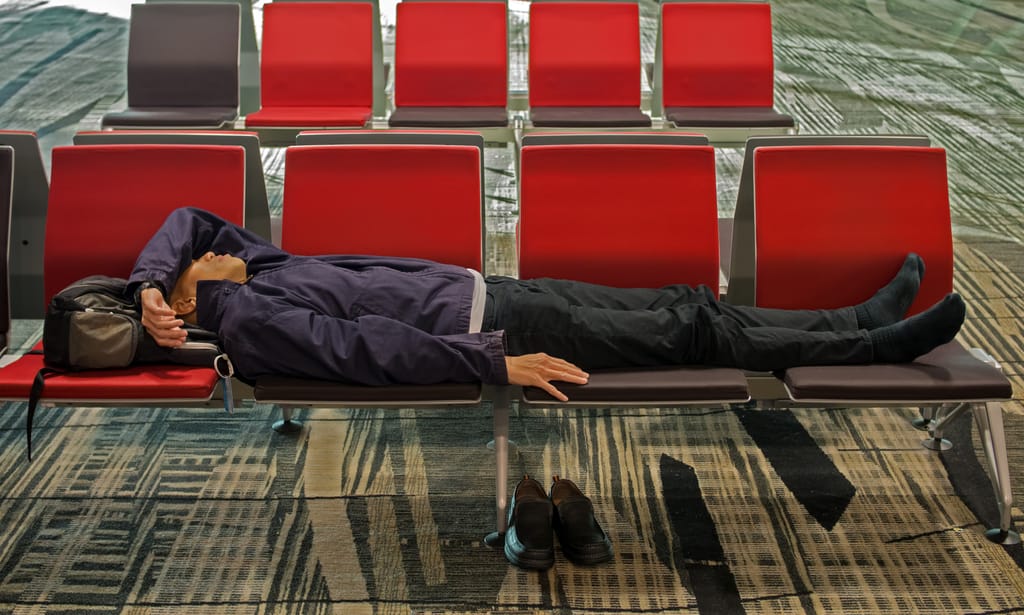What is Jet Lag?
Jet lag is a transitory condition that occurs when traveling across time zones. The body’s natural clock, or circadian rhythm, gets out of sync and thus causes the condition. Symptoms include fatigue, headache, difficulty concentrating, and gastrointestinal troubles.
You can ward off or minimize this condition by attuning to the new time zone before departure, drinking enough water, and averting caffeine and alcohol. Treatment includes rest, fluids, and over-the-counter drugs for relief of symptoms.

Symptoms and causes of jet lag
Jet lag is a common problem for air travelers. The body’s natural rhythm, being disrupted by crossing several time zones, caused it. It can lead to fatigue, insomnia, and digestive problems. It can also make you feel exasperated and disoriented.
- While there is no one remedy, there are a few things you can do to help reduce its effects.
- When you are planning your trip, try to organize your flights so that you will lessen the number of time zones you cross.
- When you are on the plane, try to get as much rest as workable by sleeping or resting. Drink plenty of water and avoid caffeine and alcohol.
- When you arrive at your destination, try to get adjusted to the local time as rapidly as possible. On the first day, seek to avoid napping and stay active. Eat light meals and avoid alcohol. Get plenty of rest at night.
There are also a few things you can do to help your body adjust to a new time zone more quickly. On the day you arrive at your destination, spend time outdoors in the sunlight. Exercise and eat healthy meals. Try to go to bed and wake up at the same time each day.
Exploring the Physical and Mental Symptoms
The most common physical symptom of jet lag is fatigue. Because the body is used to a certain daily rhythm, it’s difficult to adjust to a new one. This can lead to fatigue, especially during the day, and difficulty falling asleep at night.
Other physical symptoms of jet lag can include headaches, dry eyes, and digestive issues. Jet lag can cause difficulty concentrating, irritability, and mood swings. It can also cause memory issues, making it difficult to remember things or to focus on tasks.
Jet lag can cause difficulty in social situations, as it can reduce a person’s ability to interact with others and make them feel disoriented. Jet lag can have serious effects on travelers, and it is important to minimize its effects. Staying hydrated, exercising, and getting plenty of sleep in the days leading up to a trip can help to reduce the severity of jet lag.

Strategies
- Adjust your sleeping and waking times to match your destination’s time zone before you even leave home. This will make the time change easier when you arrive.
- Napping can make jet lag worse, so try to stay awake until your destination’s bedtime. This can be tough, but the more you can stay awake, the easier it will be for your body to adjust to the new time zone.
- Get some exposure to natural light as soon as possible after you arrive at your destination. Sunlight helps your body adjust to the new time zone, so try to get as much natural light as possible. Open the shades and curtains in your hotel room, or go for a walk outside if you can.
- Drinking plenty of water can help keep your energy levels up and help your body adjust to the new time zone. Avoid sugary drinks and alcohol, which can make you feel worse.
- Exercise can help you adjust to the new time zone, so try to get some light exercise each day. Even a short walk can make a difference.
- Avoid consuming alcohol and caffeine during the flight, as they can increase dehydration and disrupt the body’s circadian rhythm.
- Adjust your sleep schedule to the new time zone as soon as possible.
- Take melatonin or other sleep aids as needed to help you sleep on the plane and in your new time zone.
- Eat healthy meals at regular intervals. By following these tips, travelers can reduce the effects of jet lag and enjoy a healthier and more enjoyable trip.
Conclusion
Jet lag is a sleep disorder that is caused by traveling across different time zones. Symptoms include fatigue, disorientation, and difficulty sleeping. There are several ways to help prevent or lessen the effects of this problem, including adjusting your schedule before you travel, eating light meals, and drinking plenty of water.
Reference
- Suni, E. (2022, November 3). Jet Lag and Sleep. Sleep Foundation. https://www.sleepfoundation.org/travel-and-sleep/jet-lag
- Jet lag disorder – Symptoms and causes. (2022, November 19). Mayo Clinic. https://www.mayoclinic.org/diseases-conditions/jet-lag/symptoms-causes/syc-20374027
- Wikipedia contributors. (2023, January 3). Jet lag. Wikipedia. https://en.wikipedia.org/wiki/Jet_lag